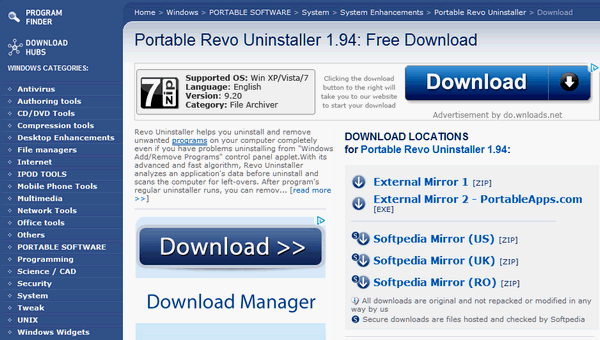SoftPedia was once a great place to go for bug-free freeware. The other day I (TC) was working on someone’s computer wearing my Cloudeight Direct hat, when I determined that the customer could benefit from a freeware program. I wasn’t sure of the developer’s Web site URL so I google the name of the program and ended up on SoftPedia. I’ve never had any problem with SoftPedia, until now. Once I landed on the page for the program download I was besieged with huge download buttons — and I was in a hurry because the customer had to leave and I wanted to finish the repair session and finalize the job (which turned out well, I’m happy to say).
It didn’t turn out well for SoftPedia — at least. I won’t be going back there for any downloads. I’m not a fan of chicanery or trickery and it’s obvious that SoftPedia placed those download buttons to intentionally trick visitors into downloading something other than what they came for. All I could think of was software bundling and now Web site bundling?
I have nothing against SoftPedia putting ads on their pages — they have a staff to pay and Web hosting expenses to pay — and they, like any other legitimate business have a right to make a profit from their endeavors.

In the picture above you can see two big blue buttons — and under one in light gray text it says “Advertisement”.
But trying to entice visitors to click the wrong download link is wrong and it’s wrong for a number of reasons. It’s not fair to the company who is paying for the ad. If people don’t want the software they download from those buttons then they have to uninstall it when they realize they’ve been tricked. It’s unnecessary hassle and it doesn’t look good for the company who paid for the ad. It’s not right to trick people into downloading something they didn’t intend to download — even if the software is legitimate. My computer, your computer, and my customer’s are not SoftPedia’s computers and it’s wrong to fool people into putting something on their computer they don’t want and probably don’t need.
I know what the SoftPedia will say — they’ll say those download buttons say “advertisement” near them. Well that may be true — but the text is in light gray on white and it’s that color for reason.
And we’re not saying SoftPedia is the only one — but they just happened to be the one I stumbled upon that day. Making money by trying to get people to click the wrong link is bad business and it isn’t right.


Yup-and this isn’t the only site that puts those download buttons all over the place. All I can say is never be in a hurry and make sure you’re getting the right one. And it seems now everyone has their own download managers to put more junk on your computer!
CNET is another and, watch Microsoft also.
How do u keep CNET and softpedia from opening when doing a download?
CNET is the offender on my computer. When i d/l something i want to do it from the original site, not some second hand man.
Can anyone help me on this?
Yes, I’ve seen that sort of thing many times. So far, I haven’t been fooled, but it’s only a matter of time…. Especially when you’re returning to a website who has already gained your trust through past experience. I agree with you TC. If you’re gonna try to make a little extra money, go for it honestly. Being devious about it is tacky and definitely “intentional”, i.e. the colors used, in this case. Softpedia’s or the advertiser’s fault? Softpedia’s, I think, if they permitted it.
Have seen this trick on multiple websites and always thought the giant download button was part of the ad provided to the website, not something the website added to increase clicks. I could be wrong. Can you definitely say that SoftPedia is to blame for the giant download buttons? (Aside from the fact they would allow that sort of advertising in the first place.)
I also own a small download (german) site, much smaller than Cnet or Softpedia.
The problems is that those ads are served via Google Adsense and A LOT of advertisers are using those kind of buttons in order to trick the unexperienced visitors.
They are “legal” as the Adsense/Adwords TOS is concerned.
I live in Germany and I see those banners on my site only using an US proxy, so geographical limitations are set.
This is the new advertising era…